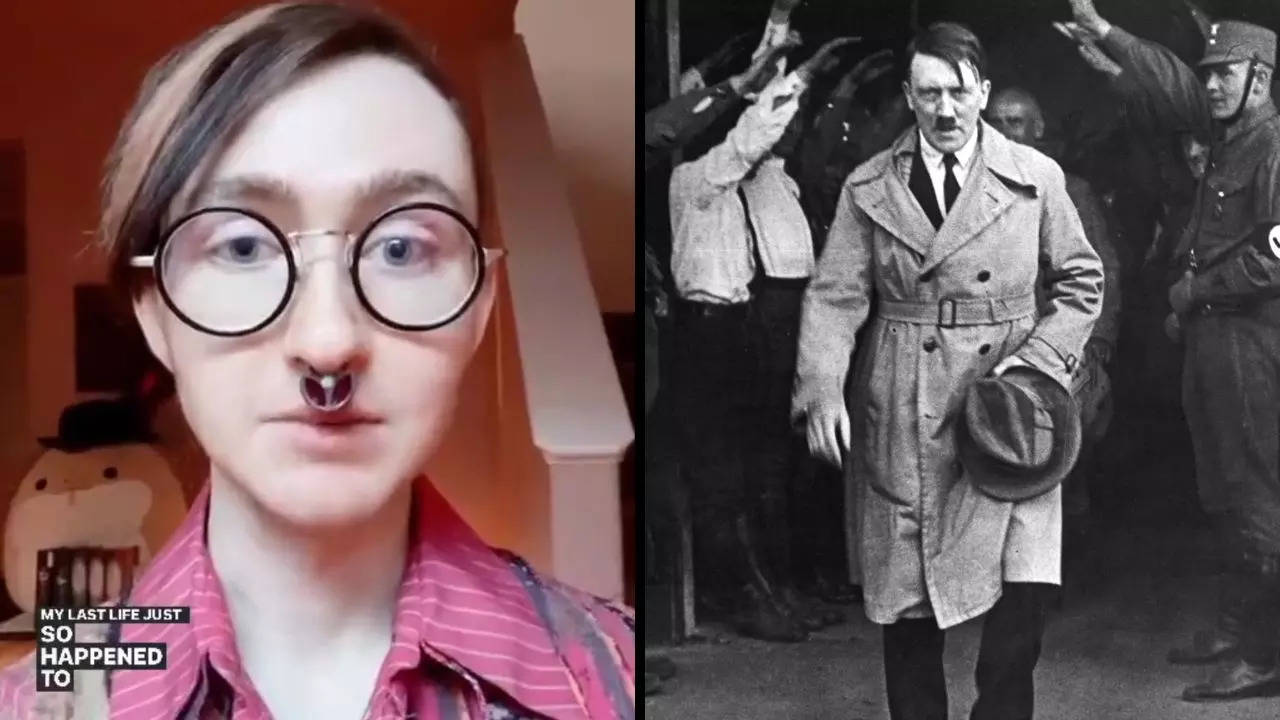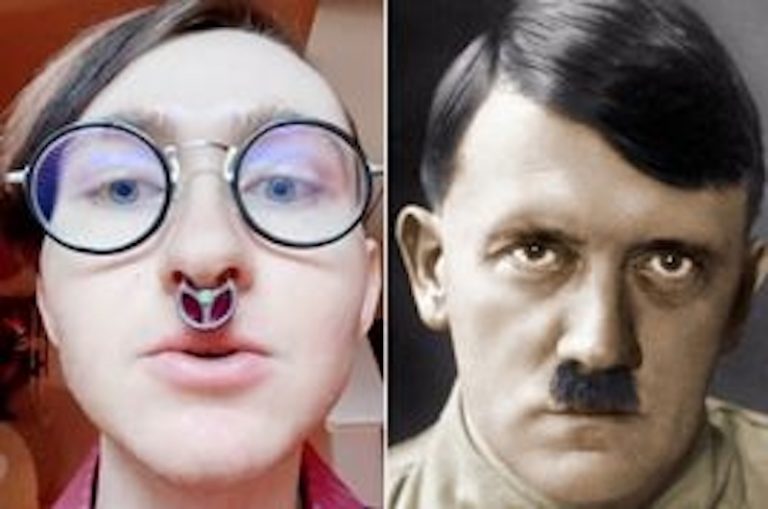Imagine scrolling through TikTok one day, and suddenly you stumble upon a user whose persona seems eerily familiar. The way they carry themselves, their tone, even their captions—everything seems to echo the dark past of Adolf Hitler. It sounds absurd, right? But in today’s digital age, where creativity knows no bounds, this concept has sparked curiosity, controversy, and endless debates. Today, we’re diving deep into the phenomenon of the "Tiktoker reincarnation of Hitler." What does it mean? Why does it matter? And most importantly, what can we learn from it?
Welcome to the world of TikTok, where history meets modern pop culture in ways no one could have predicted. This platform isn’t just about lip-syncing or dance challenges anymore—it’s become a breeding ground for creative expressions, some of which tread dangerously close to sensitive topics. One such trend involves users who claim to be the reincarnation of historical figures, including none other than Adolf Hitler himself.
Now, before you dismiss this as mere clickbait, let me assure you—this is more than just a viral sensation. It raises important questions about how we engage with history, the ethics of digital content creation, and the impact of viral trends on society. So buckle up because we’re about to explore this fascinating yet controversial topic in detail!
Read also:Good Morning Letter To Make Her Fall In Love The Ultimate Guide To Sweeping Her Off Her Feet
What Exactly Is a Tiktoker Reincarnation of Hitler?
Let’s start with the basics. When we talk about a "Tiktoker reincarnation of Hitler," we’re referring to TikTok users who either jokingly or seriously portray themselves as the reborn version of one of history’s most infamous dictators. These accounts often feature content that mimics Hitler’s mannerisms, speech patterns, or even his infamous speeches—but with a twist. Instead of promoting hate, these videos usually aim to entertain or spark conversations about history and its relevance today.
Understanding the Concept
For many creators, the idea of being the "reincarnation of Hitler" serves as a metaphorical tool to explore themes like power, influence, and human behavior. Others might use it purely for comedic purposes, poking fun at the absurdity of such a claim. Regardless of intent, these videos often go viral, drawing millions of views and sparking heated discussions among viewers.
Why Does This Trend Exist?
Human beings have always been fascinated by the idea of reincarnation—the belief that souls return to earth in different forms after death. Combine this with the allure of infamous historical figures like Adolf Hitler, and you’ve got a recipe for viral content. But why exactly do people gravitate toward this particular concept?
- Curiosity: People are naturally drawn to controversial topics. The idea of Hitler returning in the form of a TikTok star taps into our innate desire to explore the unknown.
- Entertainment: Let’s face it—content that pushes boundaries tends to get more attention. By playing with sensitive themes, creators can capture audiences in ways traditional content might not.
- Historical Awareness: Some creators argue that their content helps educate younger generations about history by presenting it in a relatable, modern context.
Breaking Down the Appeal
While some might dismiss this trend as trivial, it’s worth noting that it resonates with a wide audience. For instance, young people who may not have direct knowledge of World War II or the Holocaust might find themselves learning about these events through TikTok videos. Of course, this raises concerns about accuracy and responsibility, but we’ll get to that later.
Who Are These Creators?
Now that we understand the concept, let’s talk about the creators behind these viral sensations. Are they serious historians? Comedians looking for laughs? Or perhaps something in between?
A Closer Look at Their Profiles
Most "Tiktoker reincarnations of Hitler" fall into two categories: those who use humor to tackle heavy topics and those who aim to educate their audience. Some popular creators include:
Read also:Davido Net Worth A Deep Dive Into The King Of Afrobeats Wealth And Success
- @historygeek: Known for his satirical takes on historical events, this creator uses Hitler’s persona to comment on current political issues.
- @timelessmemes: Focused on blending history with pop culture, this account often features Hitler reacting to modern phenomena like smartphones or social media.
- @darkhumorhub: Specializing in dark comedy, this user doesn’t shy away from controversial subjects, including the idea of Hitler’s "reincarnation."
Is There Any Historical Basis?
Before we dive deeper, let’s address the elephant in the room: Is there any truth to the idea of Hitler’s reincarnation? Spoiler alert—no, there isn’t. While reincarnation is a belief held by certain cultures and religions, there’s no scientific evidence to support it. However, this doesn’t stop people from speculating or using the concept as a creative device.
Separating Fact from Fiction
It’s crucial to distinguish between artistic expression and factual accuracy. While these TikTok creators might claim to be the "reincarnation of Hitler," their content should be viewed as entertainment rather than truth. That said, this trend highlights the importance of critical thinking and media literacy in today’s digital landscape.
Controversy Surrounding the Trend
As you might expect, the idea of a "Tiktoker reincarnation of Hitler" isn’t without its fair share of controversy. Critics argue that it trivializes serious historical events, while supporters claim it’s a harmless way to engage with history. So, who’s right?
Key Arguments Against the Trend
- Insensitivity: Many feel that using Hitler’s persona for entertainment purposes disrespects the millions of lives lost during the Holocaust.
- Misinformation: There’s a risk that viewers might mistake these videos for factual content, leading to misunderstandings about history.
- Moral Responsibility: Creators have a duty to ensure their content doesn’t perpetuate harmful stereotypes or ideologies.
Counterarguments in Favor
- Education Through Entertainment: Advocates argue that these videos can serve as an entry point for people to learn more about history.
- Creative Expression: Art has always pushed boundaries, and TikTok is just another medium for creators to experiment with new ideas.
- Context Matters: When done responsibly, these videos can spark meaningful conversations about the lessons of history.
Impact on Society
So, what impact does this trend have on society? Is it a harmless form of entertainment, or does it contribute to a culture of insensitivity? The answer, as always, lies somewhere in the middle. While some viewers might find these videos funny or enlightening, others might feel offended or triggered by the content.
Addressing the Ethical Dilemma
Creators must weigh the potential benefits of their content against the risks. For example, if a video about Hitler’s "reincarnation" leads to increased awareness about the Holocaust, that’s a positive outcome. On the other hand, if it perpetuates harmful stereotypes or misinformation, it’s a step backward.
How to Approach This Topic Responsibly
For those interested in exploring this trend, there are ways to do so responsibly. Here are a few tips:
- Do Your Research: Make sure you have a solid understanding of the historical context before creating or consuming content.
- Be Mindful of Your Audience: Consider how your content might be perceived by different groups of people.
- Promote Critical Thinking: Encourage viewers to question what they see and seek out additional information.
Encouraging Responsible Content Creation
Platforms like TikTok have a responsibility to ensure that their users create content that respects historical and cultural sensitivities. By promoting guidelines and offering resources, they can help foster a more thoughtful and informed community.
Conclusion: Where Do We Go From Here?
As we’ve seen, the phenomenon of the "Tiktoker reincarnation of Hitler" is both fascinating and controversial. While it raises important questions about history, ethics, and digital media, it also highlights the power of creativity and expression in shaping our understanding of the world. So, the next time you come across one of these videos, take a moment to reflect on its implications—and remember, with great power comes great responsibility.
Now it’s your turn! What do you think about this trend? Do you see it as a form of entertainment, education, or something else entirely? Share your thoughts in the comments below, and don’t forget to check out our other articles for more insights into the world of TikTok and beyond!
Table of Contents
- Tiktoker Reincarnation of Hitler: A Deep Dive into Viral Sensations and Historical Echoes
- What Exactly Is a Tiktoker Reincarnation of Hitler?
- Understanding the Concept
- Why Does This Trend Exist?
- Who Are These Creators?
- Is There Any Historical Basis?
- Controversy Surrounding the Trend
- Impact on Society
- How to Approach This Topic Responsibly
- Conclusion: Where Do We Go From Here?

